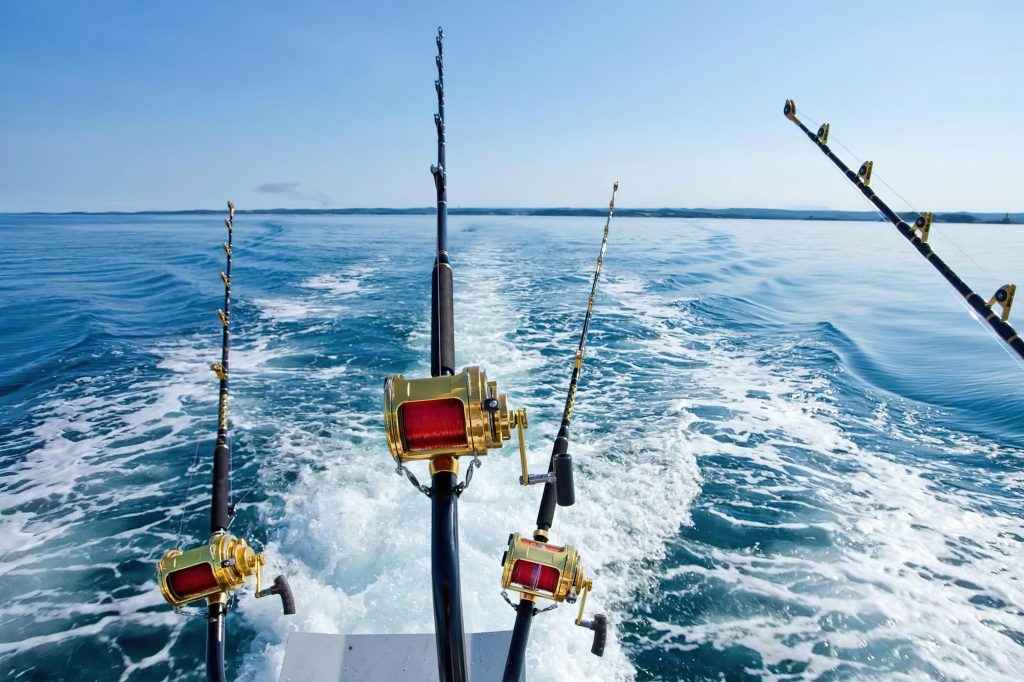Trolling is a popular method of fishing that involves dragging a lure or baited line behind a moving boat. This technique is effective for catching a variety of fish species, including salmon, trout, walleye, and more. In this article, we will explore the basics of trolling fishing, including techniques, equipment, and tips for success.
Techniques for Trolling Fishing
Flat lining is a popular trolling technique that involves using lures or baits that can be trolled with a shallow diving depth. This can be accomplished by using lightweight lures, small weights or by adjusting the speed of the boat to keep the lures near the surface. It is important to keep a constant eye on the bait or lure, as they can easily get caught in weeds or other underwater structures.
Downrigger fishing, on the other hand, uses a weight and cable to lower the bait or lure to a specific depth. The downrigger is attached to the boat and is used to precisely control the depth at which the bait or lure is presented to the fish. This technique is particularly useful for targeting species that feed at deeper depths or for fishing in areas with steep drop-offs or sharp underwater structures.
Both flat lining and downrigger fishing require careful attention to detail and can be quite effective when used correctly. The choice of technique often depends on the species of fish being targeted and the conditions of the water. By using the right equipment and paying attention to the behavior of the fish and the environment, anglers can greatly increase their chances of success when trolling for fish.
When trolling, it’s important to vary the speed and direction of the boat to create a more realistic movement of the bait or lure. This can be accomplished by changing the speed of the boat, adjusting the trolling depth, or using techniques like “zigzagging” or “figure-eighting” to create erratic movements.
Equipment for Trolling Fishing
To effectively troll for fish, you’ll need the right equipment. This includes a sturdy rod and reel with a line capacity that can handle the weight of the bait or lure, as well as a variety of trolling lures or baits. Some popular types of trolling lures include spoons, plugs, and flashers, which are designed to imitate the movement and appearance of live bait.
In addition, many anglers use downriggers to help control the depth of the bait or lure. A downrigger consists of a weight and a cable that attaches to the fishing line, allowing the bait or lure to be lowered to a specific depth. Other useful equipment for trolling fishing includes a fish finder to locate schools of fish, and a trolling motor to help control the speed and direction of the boat.
Tips for Success in Trolling Fishing
To increase your chances of success when trolling for fish, it’s important to follow a few key tips. First, pay attention to the weather and water conditions, as these can greatly impact the feeding patterns and behavior of fish. When trolling, try to mimic the movement and behavior of the prey that the fish are feeding on, using lures or baits that match the size, color, and movement of the natural prey.
It’s also important to be patient and persistent when trolling for fish. Some days may be slow, while others may be incredibly productive. By staying focused and adapting to changing conditions, you can increase your chances of success and reel in some impressive catches.
In addition, it’s important to follow all fishing regulations and guidelines, including size and catch limits, to ensure the sustainability of the fish population and the health of the ecosystem.
Conclusion
Trolling fishing is an effective and enjoyable method of fishing that can be used to catch a variety of fish species. By using the right techniques, equipment, and tips for success, anglers can increase their chances of catching big fish and enjoying a memorable day on the water. Whether you’re a seasoned pro or a beginner, trolling fishing is a technique that can provide hours of excitement and adventure on the water.

